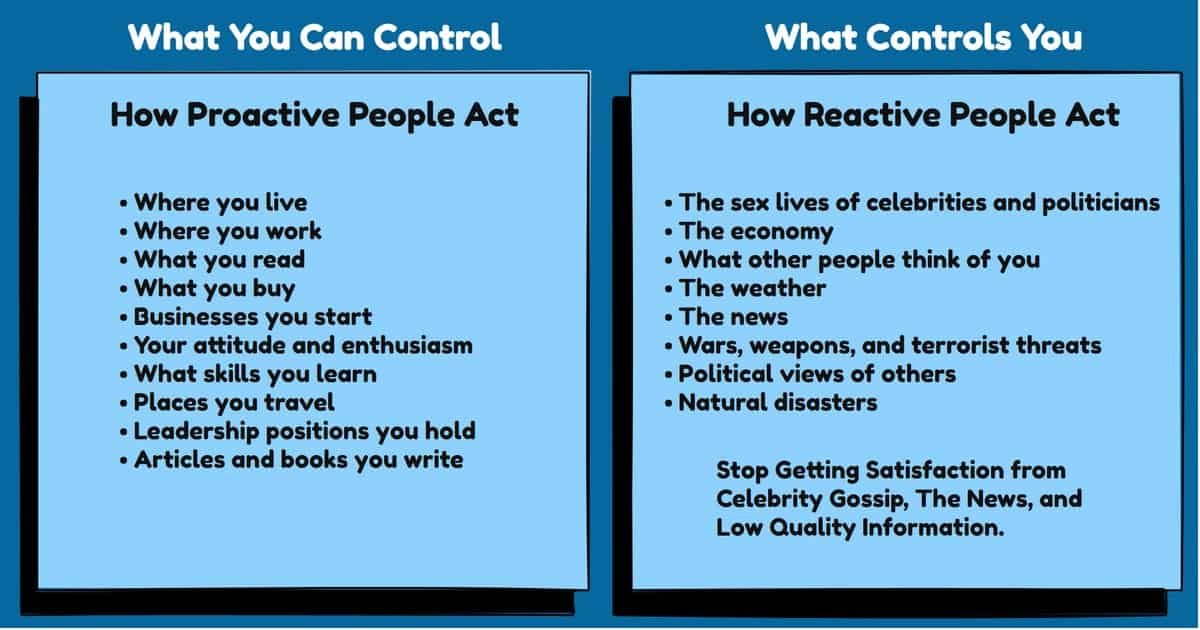
How much time do you spend watching, reading, or listening to information that you have no way of doing anything about?
Lets face it, most of it you and I don’t care deeply about anyway. It just provides a quick rush of dopamine, which is the feeling of this reward hormone in our body.
My Grandparents always watched the nightly news. They would get so caught up in the episode that the next day their physiological self was being affected by what they saw the night before. The nightly news is based on a cycle of local crimes, disasters, political rhetoric, and these news companies perpetuate on three emotions: fear, panic, and anger. For you this same physiological effect may come from the endless stream of Facebook and Twitter X updates, celebrity gossip, reality TV shows, or Google News articles. The list is unlimited.
In this age, where everyone seems to be overloaded with information, your life can be filled with irrelevant or unnecessary information very quickly.
Here’s the main problem:
After a week or two of these iterations, this type of information begins to become normal to your mind and physiology. Your body gets used to the overloaded dopamine rush of your response to this fear, panic, and anger, and actually gets addicted to this higher than normal level of dopamine production.
Dopamine is a good and needed neurotransmitter and hormone, yet it is not to be abused by overloading your system with it on a day after day. Our bodies get so oversaturated that we are constantly pushing for higher dosages of dopamine. There comes a point where we need to produce more and more yet we get less and less stimulation from it. Our receptors begin to downregulate, becoming less sensitive. It gets to a point where we feel uncomfortable sitting in peace and quiet and feel restless. I’ve always loved this quote that demonstrates this problem perfectly:
“All of humanity’s problems, stem from man’s inability to sit quietly in a room alone.”
Blaise Pascal
Pretty soon, you’re logging onto Facebook in fear of missing out (FOMO) on “something.” You turn on the news or check CNN, not because you are really interested about a particular news area, but now because of a forced habit. You watch tonight’s reality TV show because that’s what you always do on Tuesday’s at 8pm.
Hey, I’m all for learning and synthesizing new information to stay informed and to enhance our future self. Simply put, education is one of the master keys to the world. And staying up-to-date on important topics can help shape your vision and help you to become a better person.
As you can see, it’s becoming dangerously easy to consume low quality information and convince yourself that it’s normal, when it isn’t helping you live a better life at all, and actually destroying our lives.
The answer to this dilemma is to focus on what you can control and act on it, while lowering the input of the things you can’t control. By acting on what we can control it will automatically distract us away from some of the inputs of the low quality information we can’t control.
As you can see in the image below, worrying about What Controls You is a hallmark of reactive people, while focusing on What You Can Control is a trait of proactive people.

What Controls You are the things that you often waste time and energy worrying about, but that you have little to no control over. Meanwhile, What You Can Control are the things that you can use to influence your daily life and future self.
As an example, the endless majority of news stories about chaos and anger, about war and terrorism, the economy and stock prices, celebrity gossip and political scandal. These all fall squarely in the What Controls You side. They can easily soak up and literally drain your time and energy. But you have little to no control over those events, so why would you spend so much time on them? It’s the rush of dopamine.
Other examples include getting angry about what someone posted on Facebook, worrying about what other people think about you, or wishing your kids would make better choices, which is a fine wish, yet still outside of your immediate control.
Related content:
- How To Achieve Impossible Goals
- What Your Anxiety Is Trying to Tell You
- How to Talk to a Control Freak
- How to Beat Procrastination and Save 21 Hours a Week
- Newsletter: Enduring a Setback by Standing On Your Convictions
Are You In Control Or Are They?
It’s great to learn new skills, follow story lines that are important to you, and become an engaged and thoughtful person, yet sadly most of our time spend consuming content doesn’t fall into those categories.
Most of us (myself included) have a handful of sources we spend large part of our time on that we could eliminate from our lives with no significant impact whatsoever.
It comes down to a matter of breaking bad habits of content consumption, and rearranging that time spent into areas that will help us grow, thus providing an outcome of more happiness and fulfillment.